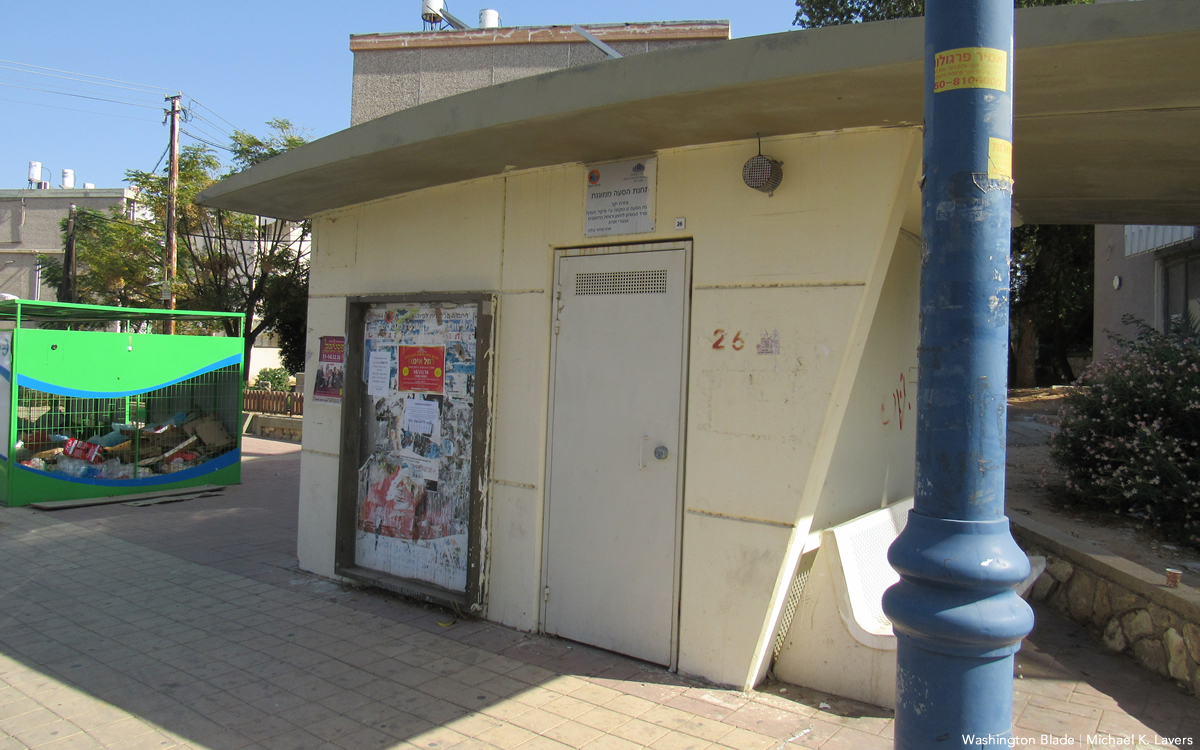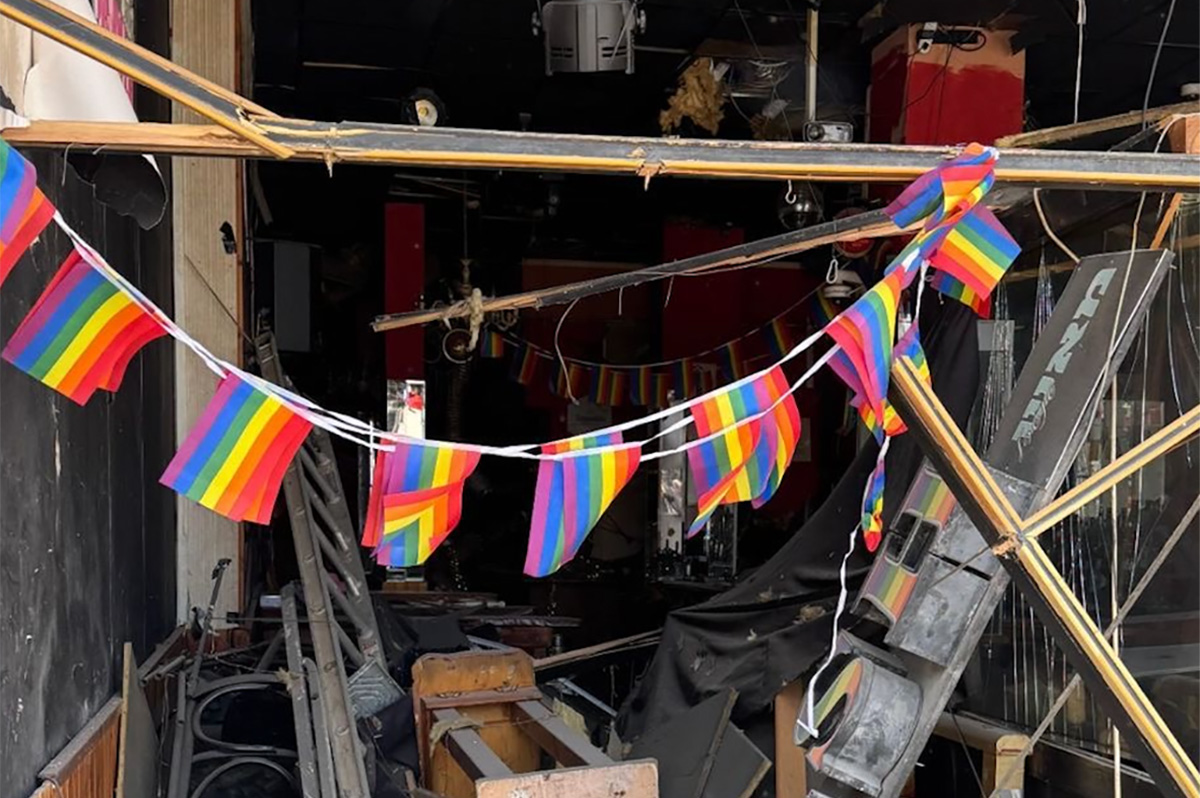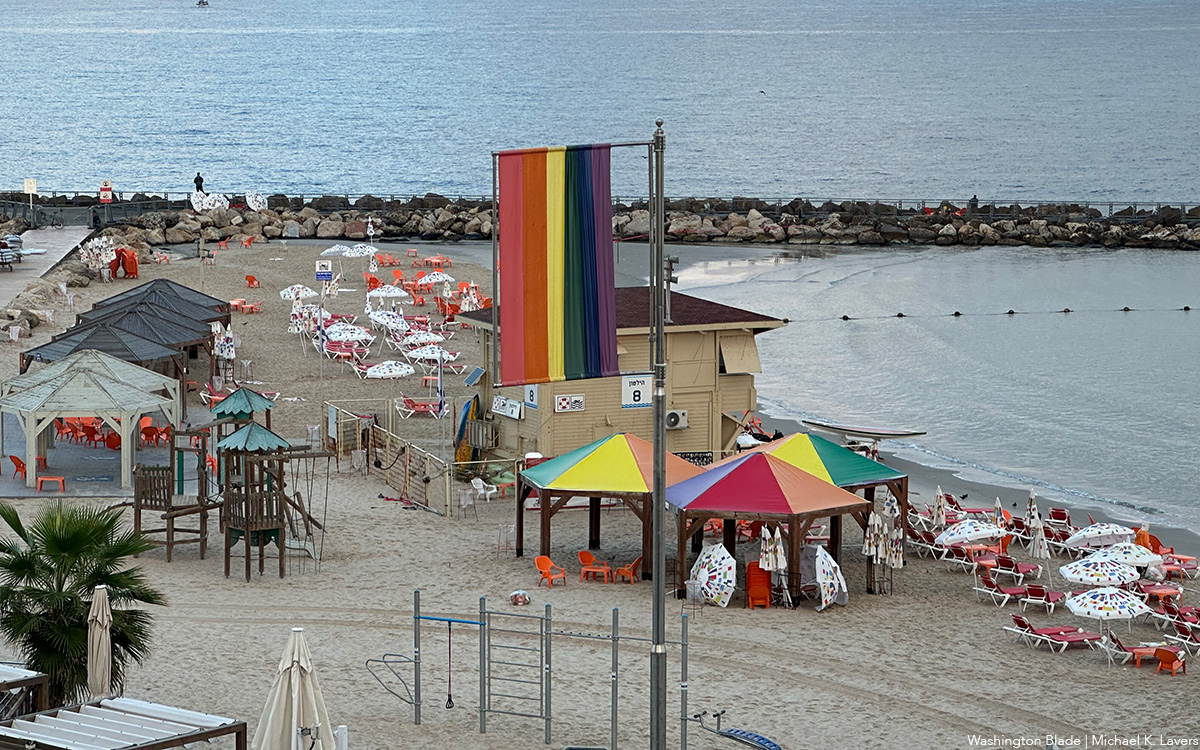Middle East
Activist remains in southern Israel as war continues
Ariella Menaker grew up near Gaza Strip

An activist in southern Israel on Thursday said she knows at least five people who have died during her country’s war with Hamas militants.
“It’s just horror and shock,” former Be’er Sheva Pride House Chair Ariella Menaker told the Washington Blade during an emotional WhatsApp interview. “They were fucking civilians.”
Beersheba, which is the largest city in southern Israel, is located roughly 25 miles southeast of the Gaza Strip.
Hamas, which the U.S. and Israel have designated a terrorist organization, on Oct. 6 launched a surprise attack against communities in southern Israel from Gaza.
More than 1,300 Israelis have been killed since the war began. This figure includes at least 260 people who Hamas militants murdered at an all-night music festival in Re’im, a kibbutz that is near the border between Israel and Gaza. The Israel Defense Forces on its website also says more than 3,200 Israelis have been injured and Hamas militants kidnapped at least 150 others.
Hamas rockets have reached Beersheba, Tel Aviv, Jerusalem, Ben Gurion Airport and other locations throughout central and southern Israel.
The Gaza Health Ministry says Israeli airstrikes have killed 1,537 people and injured 6,612 others in the enclave.
The Israeli government’s decision to cut electricity, water and food and fuel shipments to Gaza has made the humanitarian crisis in the territory even worse. Media reports indicate the IDF has told the U.N. the 1.1 million people who live in northern Gaza should evacuate to the southern part of the enclave within 24 hours.
Menaker said she received an invitation to attend one of the music festival’s parties.
“It’s a close-knit group,” she told the Blade. “Even people you don’t know by name; you’ve partied with them; you know them. You’ve known them for years from the dance floor.”
“I keep thinking about them, trying to escape,” added Menaker.
Southern Israel ‘accustomed to sirens and bomb threats’
Menaker lived in Sderot, a town that is less than a mile from Gaza, until she and her family moved to Beersheba when she was 10.

She was at home in Beersheba on Oct. 7 when air raid sirens woke her up shortly after 6:30 a.m. local time (11:30 p.m. ET on Oct. 6.) Menaker told the Blade she was in her pajamas when she grabbed her cats and took shelter near a set of stairs that are away from windows. She said the door to the bomb shelter near her home did not close because someone had previously broken into it.
“I just stayed at home with the cats in an enclosed area near the stairs, as safe as I can be,” said Menaker.
She told the Blade she had COVID-19 a couple of weeks ago and was worried that she would spread the virus to other people with whom she was sheltering. Menaker said this fear made her decide to stop going to the shelter.
“You’re literally under bombs and Hamas people are in the streets, so who’s thinking about a mask,” she recalled. “I was there with everybody, no masks, just thinking it’s another bombing and there will be another fucking operation they’ll call it instead of a war and that situation will continue.”
Menaker said people in southern Israel had “gotten accustomed to sirens and bomb threats.”
“We’ve gotten used to the so-called small assaults (against Hamas in Gaza), like every now and then we go to the shelter,” she told the Blade. “We’ve come to trust the Iron Dome, so we’re not as scared as we were before because there’s less direct hits, and we’re used to it and that’s horrific.”
Menaker also told the Blade she feels “sorry for the people living in Gaza.”
“I hate Hamas, don’t get me wrong,” she said. “Hamas hates me and wants everybody dead … but the people itself living in Gaza, I mean I feel sorry for them.”
Menaker said she and her family visited Gaza on weekends — and people who lived in the enclave traveled to Israel — before then-Prime Minister Ariel Sharon’s government withdrew Israeli forces from the territory in 2005.
“There’s always been tension,” said Menaker. “What’s happening now has been my personal nightmare and fear since the separation since 2005.”
Menaker dog sitting IDF reservist’s dog
Advocacy groups across Israel have rallied to support those who the war has directly impacted. Hasan Kilani, a Jordanian Palestinian queer activist, and myriad others have urged Israel not to target Gazan civilians.
“There’s no justification for war crimes and crimes against humanity,” Menaker told the Blade, referring to the Hamas militants who murdered Israeli civilians. “There’s no way to justify going into a town and house by house killing everybody inside.”
She said “all of the people here in Israel” are “trying to help out with everything” that include offers to house those who have evacuated to Beersheba and other cities and collect food and toys for them.
Menaker spoke to the Blade from the home of a friend who is in the IDF reserves. She was babysitting his dog and taking him out for walks.
“That’s a little something we can do,” said Menaker.
Doctors had prescribed Menaker medicinal marijuana in order to treat post-traumatic stress disorder. She began to smoke it a few minutes after she started to speak with the Blade.
“People are dealing with a lot,” said Menaker.
Editor’s note: Menaker sent the Blade this update on Friday at 7:43 a.m. (9:43 p.m. PT on Thursday)
“Last night there was a barrage of rockets to Beersheba just as we finished packing and sending off food packages for families that were rescued. Running to the bomb shelter and seeing rockets above, and than just continuing shutting down and going home to a community Zoom.
One or two people didn’t join because of anxiety, the rest just kept on. Which is good, to keep on, but I guess that’s what I mean when I say we got used to it.”
Israel
Activist recalls experience in Tel Aviv after Israel-Iran war began
Marty Rouse was part of Jewish Federations of North America Pride mission

A long-time activist who was in Israel last month when its war with Iran began has returned to D.C.
Marty Rouse traveled to Israel on June 6 with the Jewish Federations of North America. The 5-day mission ended the night before the annual Tel Aviv Pride parade was scheduled to take place.
Mission participants met with Israeli President Isaac Herzog and several LGBTQ activists in Tel Aviv and Jerusalem. They visited the Western Wall, the Nova Music Festival site, and Nir Oz, a kibbutz in southern Israel that is less than a mile from the country’s border with the Gaza Strip. Mission participants also visited Sderot, a city that is roughly a mile from the Hamas-controlled enclave, a veterans rehabilitation facility, a new LGBTQ health center and the Aguda: The Association for LGBTQ Equality in Israel in Tel Aviv.
Hamas militants on Oct. 7, 2023, killed upwards of 360 partygoers and kidnapped dozens more at the music festival that was taking place at a campground near Re’im, a kibbutz that is roughly 10 miles southwest of Nir Oz. The militants killed or took hostage nearly a quarter of Nir Oz’s residents. They also took control of Sderot’s police station.

Tel Aviv Deputy Mayor Chen Arieli spoke at the mission’s closing party that took place at the Sheraton Grand, a hotel that overlooks Tel Aviv’s beachfront, on June 12.
Rouse and other mission participants planned to stay in Tel Aviv for the Pride parade, which was scheduled to take place the following day. He and Gordie Nathan, another mission participant who lives in Palm Springs, Calif., had checked into a nearby hotel that was less expensive.
“We said our farewells,” recalled Rouse when he spoke with the Washington Blade in D.C. on June 24. “We went to our hotels, and we get the warning, and then all hell broke loose.”
Israel early on June 13 launched airstrikes against Iran that targeted the country’s nuclear and military facilities.
Rouse said mission organizers told him and other participants who remained in Tel Aviv to meet at the Sheraton Grand for breakfast and dinner — Israel’s airspace was closed in anticipation of an Iranian counterattack, and authorities cancelled the Pride parade.
He said he went to bomb shelters at least twice a night for three nights.
Israel’s Home Front Command during the war typically issued warnings about 10 minutes ahead of an anticipated Iranian missile attack. Sirens then sounded 90 seconds before an expected strike.
Rouse and Nathan walked to the Sheraton Grand on June 13 when the Home Front Command issued a 10-minute warning. They reached the hotel in a couple of minutes, and staff directed them to the bomb shelter.
“You know to walk slowly, everything’s fine,” recalled Rouse. “You get 10 minutes, so everything was fine when the alarm goes off.”
Rouse described the Sheraton Grand shelter as “well lit” with WiFi, a television, and air conditioning. He was watching an Israeli television station’s live coverage of the Iranian missile attack when he saw one hit an apartment building in the Tel Aviv suburb of Ramat Gan.
A 74-year-old woman died and her boyfriend was seriously injured.
“I go over to look at the TV, just to watch,” recalled Rouse. “All of a sudden, you watch, and you see one bomb go and land and explode in Tel Aviv on TV. It landed and blew up.”
“I was like, okay, this is real, and so that was scary,” he added.
Rouse said the bomb shelter in the hotel where he and Nathan were staying after the mission ended was far less comfortable.
“It was dark. It was humid. It was hot. It was very uncomfortable,” said Rouse. “You really felt alone.”

Rouse and nearly everyone else on the mission who were in Tel Aviv when the war began left Israel on June 15. They boarded buses that took them to the Jordanian capital of Amman, which is a roughly 2 1/2-hour drive from Tel Aviv through the West Bank.
Rouse described the trip as “like a field trip” until they drove across the Jordan River and arrived at the Jordanian border crossing.
“You walk into this room, and instead of being in a well air-conditioned airport, you’re in this hot, humid, small place in the middle of the desert, packed with people, and those big, large, loud fans and pictures of military people on the walls,” he said. “It was almost like a Casablanca kind of feeling.”
Rouse said Jordanian authorities brought mission participants through customs in groups of 10. A Jewish Federations of North America liaison from Amman who previously worked as a tour guide for A Wider Bridge — a group that “advocates for justice, counters LGBTQphobia, and fights antisemitism and other forms of hatred” — went “behind closed doors” to ensure everyone was able to enter the country.
“It took a really long time,” Rouse told the Blade.

Mission participants arrived in Amman a short time later. They checked into their hotel and then had dinner at a restaurant.
“Now we feel like we’re safe and we’re in Amman,” recalled Rouse. “We’re sitting outside having a beautiful dinner.”
Iranian missiles passed over Amman shortly after Rouse and the other mission participants had begun to eat their dessert. They went inside the restaurant, and waited a few minutes before they boarded busses that brought them back to their hotel.
“No one was openly freaking out, which I was surprised by,” said Rouse.
The group was scheduled to fly from Amman to Cairo at 11 p.m. local time (4 p.m. ET) on June 16. They visited Jerash, an ancient city north of Amman, before their flight left Jordan.
“[The Jerash trip] actually took our minds off of everything,” said Rouse.
A Jewish Federations of North America contact met Rouse and the other mission participants at Cairo’s airport once their flight landed. Rouse arrived at JFK Airport in New York on June 17.
Trump-announced ceasefire ended 12-day war
President Donald Trump on June 23 announced a ceasefire that ended the 12-day war.
The U.S. three days earlier launched airstrikes that struck three Iranian nuclear sites. The ceasefire took effect hours after Iran launched missiles at a U.S. military base in Qatar.
Iran said the war killed more than 900 people in the country.
The Associated Press notes Iranian missiles killed 28 people in Israel. One of them destroyed Tel Aviv’s last gay bar on June 16.
The war took place less than two years after Oct. 7.
The Israeli government says Hamas militants on Oct. 7, 2023, killed roughly 1,200 people on that day when it launched its surprise attack on the country. The militants also kidnapped more than 200 people.
The Hamas-controlled Gaza Health Ministry says Israeli forces have killed nearly 55,000 people in the enclave since Oct. 7. Karim Khan, the International Criminal Court’s chief prosecutor, has said Israeli Prime Minister Benjamin Netanyahu and former Hamas leader Yahya Sinwar, who the IDF killed last October, are among those who have committed war crimes and crimes against humanity in Gaza and Israel.

Rouse upon his return to the U.S. said he “was never as aware of the comfort of another human being than I was during that time.” Rouse affectionately called Nathan his “bomb shelter boyfriend” and even questioned the way he reacted to the missile alerts.
“He’s sitting on the edge of the bed and he goes, okay, I’m going to put on my socks and my shoes, and I say, really? You’re going to put on your socks,” Rouse told the Blade. “The fact that I was nervous, that putting on socks might have changed the direction of our lives, to me was like I can’t believe I said that to him.”
Rouse quickly added Nathan helped him remain calm.
“If I was by myself, those nights would have been long enough,” said Rouse. “It’s a totally different feeling to be with another human that you know than to be by yourself.”

Rouse also praised the Jewish Federations of North America.
“JFNA really sprung into action and started to figure out all options to get us all safely home,” said Rouse. “It was all about logistics. Staff worked around the clock identifying and then mobilizing to get us back to the states. It was a great team effort and I know I speak for everyone in expressing our deep appreciation for their dedication to getting us safely home.”
Israel
Iranian missile destroys Tel Aviv’s last gay bar
Mash Central is a few blocks from US Embassy

An Iranian missile on June 16 destroyed a gay bar in Tel Aviv, Israel.
The missile struck Mash Central, which is a few blocks from the U.S. Embassy on Allenby Street, and surrounding buildings. Israeli sources confirmed to the Washington Blade that Mash Central was the only gay-specific bar in Tel Aviv.
“Iran’s missile strike yesterday destroyed Tel Aviv’s only dedicated gay bar,” reads one Instagram post with pictures from inside the bar. “This place provided a safe space for minorities to express themselves — now it’s trashed.”
Mash Central describes itself as Tel Aviv’s “last gay bar standing,” even though the city promotes itself as one of the world’s most LGBTQ-friendly cities.
Israel on June 13 launched airstrikes against Iran that targeted the country’s nuclear and military facilities. Iran since the war began has launched hundreds of missiles towards Israel.
Tel Aviv’s Pride parade was scheduled to take place on June 13, but authorities cancelled it. Caitlyn Jenner, who was to have been the event’s guest of honor, is among those who were stranded in Israel after the war began.
Israel
Tel Aviv Pride parade cancelled after Israel attacks Iran
Caitlyn Jenner was to have been guest of honor

Tel Aviv authorities on Friday cancelled the city’s Pride parade after Israel launched airstrikes against Iran.
The Associated Press notes the Israeli airstrikes targeted nuclear and military facilities in Iran. Reports indicate the airstrikes killed two top nuclear scientists and the leader of Iran’s Revolutionary Guard.
Iran in response to the airstrikes launched more than 100 drones towards Israel. The Israel Defense Forces said it intercepted them.
The Tel Aviv Pride parade had been scheduled to take place on Friday. Caitlyn Jenner was to have been the event’s guest of honor.
Authorities, in consultation with local LGBTQ activists, last year cancelled the Tel Aviv Pride parade out of respect for the hostages who remained in the Gaza Strip after Oct. 7. Jerusalem’s annual Pride parade took place on June 5.
-

 U.S. Supreme Court3 days ago
U.S. Supreme Court3 days agoSupreme Court to consider bans on trans athletes in school sports
-

 Out & About3 days ago
Out & About3 days agoCelebrate the Fourth of July the gay way!
-

 Virginia3 days ago
Virginia3 days agoVa. court allows conversion therapy despite law banning it
-

 Federal Government5 days ago
Federal Government5 days agoUPenn erases Lia Thomas’s records as part of settlement with White House












